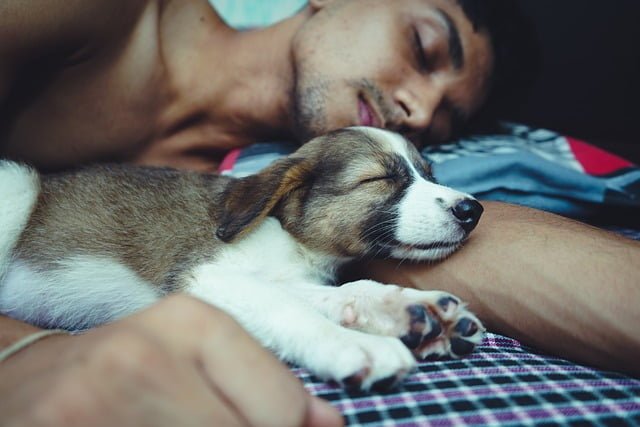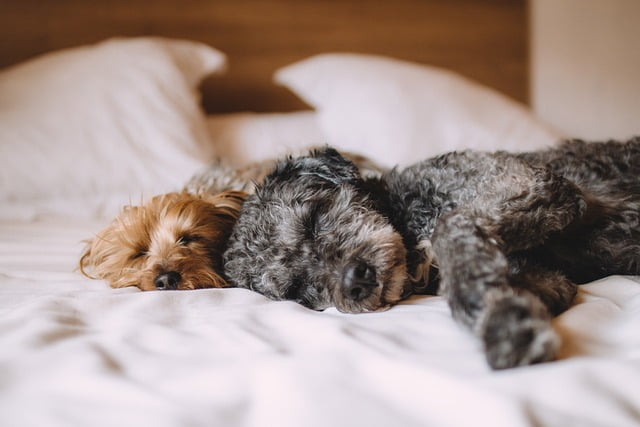My puppy won’t sleep unless next to me. What do I do?
 Do you have a furry little friend who just won’t let you get a good night’s sleep? If your puppy insists on snuggling up next to you every night, you’re not alone. While it may seem cute and comforting at first, co-sleeping with your puppy can actually be dangerous and disruptive to your sleep. So, what can you do if your puppy won’t sleep next to you? In this article, we’ll explore the reasons why puppies want to sleep next to their owners, the risks of co-sleeping, and, most importantly, how to help your puppy sleep on their own. By the end of this article, you’ll have the tools and knowledge you need to ensure that both you and your puppy can get a good night’s rest.
Do you have a furry little friend who just won’t let you get a good night’s sleep? If your puppy insists on snuggling up next to you every night, you’re not alone. While it may seem cute and comforting at first, co-sleeping with your puppy can actually be dangerous and disruptive to your sleep. So, what can you do if your puppy won’t sleep next to you? In this article, we’ll explore the reasons why puppies want to sleep next to their owners, the risks of co-sleeping, and, most importantly, how to help your puppy sleep on their own. By the end of this article, you’ll have the tools and knowledge you need to ensure that both you and your puppy can get a good night’s rest.
Why do puppies want to sleep next to their owners?
Puppies are social animals and are hardwired to live in packs. They are born into a litter and spend their first few weeks with their siblings and mother. This pack mentality is ingrained in their DNA, and even as they grow up and become domesticated, they still crave the companionship and security of being part of a group.
When a puppy joins a new family, their owner becomes their pack leader. Puppies see their owner as a source of comfort and safety, which is why they want to sleep next to them. It’s important to remember that your puppy is still adjusting to their new surroundings and needs time to feel secure in their new home.
In addition to the pack mentality, puppies may also feel safe and secure when they find it hard to sleep unless they are next to their owners. Because dogs have an acute sense of smell and are very attuned to their owner’s scent, sleeping next to their owner can provide them with a sense of comfort and security.
Another reason why your puppy won’t sleep unless next to you is separation anxiety. Separation anxiety is a common problem in dogs, particularly in puppies, and it can cause them to become distressed when they are separated from their owner. Such behavior may lead to destructive actions, incessant barking, and other undesirable behaviors. By sleeping next to their owner, puppies may feel less anxious and be able to sleep more peacefully.
The dangers of co-sleeping with your puppy
While co-sleeping with your puppy may seem like a good idea, it can actually be quite dangerous. Here are some of the dangers of co-sleeping with your puppy:
Risk of suffocation
Puppies are small and can easily be accidentally smothered or suffocated while sleeping in bed with their owners. This can happen if the owner rolls over onto the puppy or if the puppy becomes trapped under blankets or pillows.
Risk of injury
Puppies are fragile and can be easily injured if they fall off the bed or get trapped between the bed and the wall.
Disrupts sleep
Puppies are notorious for their restless sleep and frequent need to go outside to potty. Sharing a bed with your puppy can disrupt your sleep and leave you feeling tired and irritable the next day.
Reinforces bad habits
Co-sleeping with your puppy can reinforce bad habits such as whining, barking, and demanding attention at night. This can make it harder to train your puppy to sleep on their own.
Poor hygiene
Puppies are not known for their cleanliness, and sharing a bed with your puppy can lead to unpleasant odors, stains, and even the transmission of diseases such as fleas and ticks.
My puppy won’t sleep unless next to me. Here’s what to do:
Now, to the main topic of discussion: If your puppy won’t sleep unless next to you, here are some tips to help them feel more comfortable and secure:
Provide a comfortable sleeping area
Start by providing your puppy with a comfortable and cozy sleeping area that they can call their own. This can be a crate, a dog bed, or a soft blanket in a quiet corner of your home. Make sure the sleeping area is comfortable and clean and that your puppy has plenty of space to move around.
Create a bedtime routine
Establishing a bedtime routine can help your puppy feel more relaxed and ready for sleep. This can include activities such as a calming walk, a warm bath, or some quiet playtime before bed. Stick to the same routine every night to help your puppy associate these activities with bedtime.
Provide a comforting scent
Placing an item with your scent, such as a shirt or a blanket, near your puppy’s sleeping area can provide them with a sense of comfort and security. Your scent can help ease their anxiety and make them feel more at ease.
Use white noise
White noise machines or calming music can help drown out any outside noises that may be keeping your puppy awake. This can create a calming and soothing environment for your puppy to sleep in.
Gradually increase the distance
If your puppy is used to sleeping right next to you, it may take some time for them to adjust to sleeping alone. Start by placing their bed or crate near your bed, and gradually move it further away each night. This will help your puppy adjust to sleeping alone without feeling abandoned.
Be patient and consistent
It may take some time for your puppy to get used to sleeping alone, so be patient and consistent with your training. Stick to a routine and provide plenty of positive reinforcement when your puppy successfully sleeps on its own.
Frequently Asked Questions
How long does it take for a puppy to get used to sleeping alone?
The amount of time it takes for a puppy to get used to sleeping alone can vary depending on the individual puppy and their personality. Some puppies may adjust quickly, while others may take several weeks or even months to get used to sleeping alone.
Should I let my puppy cry it out when learning to sleep alone?
It’s important to strike a balance between comforting your puppy and teaching them to sleep alone. While it’s okay to offer comfort and reassurance, it’s also important to avoid creating a dependence on being near you at all times. Gradually increasing the amount of time your puppy spends alone can help them learn to sleep on their own without causing excessive distress.
What if my puppy continues to cry or whine when left alone?
If your puppy continues to cry or whine when left alone, it’s important to rule out any underlying health issues. Once you’ve ruled out any medical concerns, you can work on gradually increasing the amount of time your puppy spends alone, offering plenty of positive reinforcement and rewards when they do well.
Can crate training help my puppy learn to sleep alone?
Yes, crate training can be a helpful tool for teaching your puppy to sleep alone. By providing a cozy and secure space for your puppy to sleep in, crate training can help them feel safe and secure even when they’re sleeping on their own.
How can I make my puppy’s sleeping area more comfortable?
You can make your puppy’s sleeping area more comfortable by providing a soft bed or blanket, a favorite toy or chew, and even a piece of clothing or blanket that smells like you. This can help your puppy feel more at ease and secure when sleeping alone.
What if my puppy has separation anxiety?
If your puppy has separation anxiety, it’s important to work with a professional trainer or behaviorist to develop a plan to help them feel more comfortable and secure when alone. This may involve a combination of training, behavior modification, and medication, depending on the severity of the anxiety.
Conclusion
By following these tips and being patient with your puppy, you can help them learn to sleep alone and develop good sleep habits that will benefit their health and well-being.


